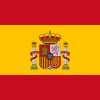President of the Government of Spain
| President of the Government of Spain Presidente del Gobierno de España |
|
|---|---|

Flag of Government Officials
|
|
| Style | Excelentísimo Señor |
| Member of |
Cabinet European Council |
| Residence | Palacio de la Moncloa |
| Seat | Madrid, Spain |
| Nominator | The Monarch Countersigned by the President of the Congress of Deputies |
| Appointer | The Monarch Following a vote of confidence by a majority of the Congress of Deputies and with the countersignature of the President of the Congress of Deputies |
| Term length | No fixed term General elections to the Congress of Deputies are held every 4 years at most. No term limits are imposed on the office. |
| Constituting instrument | Constitution of 1978 |
| Formation | 1834, 1978 (in its current incarnation) |
| First holder | Francisco Martínez de la Rosa, Adolfo Suárez (current Constitution) |
| Deputy | Vice President of the Government |
| Salary | €78,185 p.a. |
| Website | www.lamoncloa.gob.es |
The President of the Government (Spanish: Presidente del Gobierno), formally known by English-speaking nations and formally translated by the European Commission Directorate-General in English as Prime Minister, is the head of the government of Spain. The current office is established under the Constitution of 1978.
The Spanish monarch nominates a candidate for the presidency who stands before the Congress of Deputies of Spain, the lower house of the Cortes Generales (parliament), for a vote of confidence in a process known as a parliamentarian investiture, effectively an indirect election of the head of government by the elected Congress of Deputies. In practice, the Prime Minister is almost always the leader of the largest party in the Congress. Since current constitutional practice in Spain calls for the King to act on the advice of his ministers, the Prime Minister is effectively the country's chief executive.
Mariano Rajoy Brey of the People's Party has been the prime minister since he was sworn in on December 21, 2011, after winning the 2011 general election.
The Spanish head of government is known, in Spanish, as the Presidente del Gobierno. Literally translated, the title is "President of the Government" but nevertheless the office-holder is commonly referred to in English as the "prime minister", the usual term for the head of government in a parliamentary system. However Spanish translations for parliamentary heads of government will follow the original titles used; thus, for example:
...
Wikipedia

